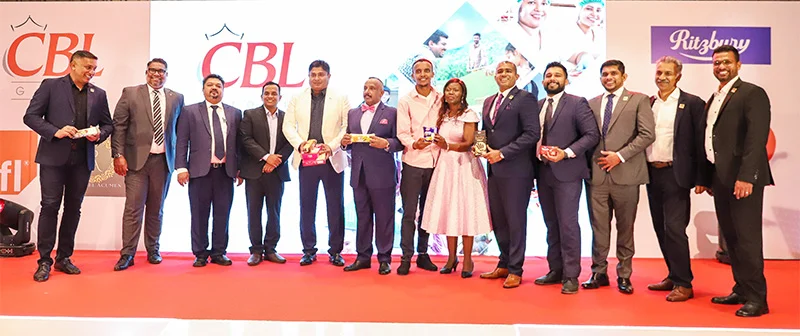Business
CBL Group expands global footprint with entry to Kenya

CBL Group, Sri Lanka’s leading food conglomerate, has entered the Kenyan market by establishing a distribution hub as part of its strategic move to strengthen exports and establish a foothold in East Africa. This expansion aligns with the company’s long-term growth strategy to extend its global reach and cater to new consumer segments.
“We are in the midst of a global expansion drive, focusing on taking our confectionery business to international markets. We see significant potential for growth in emerging markets, and these are the regions where we can drive innovation forward. With a strong presence in over 65 countries, we are committed to further expanding our export business in the coming years. Our entry into Kenya marks a significant milestone in strengthening our global presence, leveraging strategic partnerships, and driving sustainable growth. As a Sri Lankan company, we remain dedicated to supporting Sri Lanka’s economic growth by taking our brands to the world and reinforcing our position as a global player in the food industry,” said Shea Wickramasinghe, Group Managing Director of CBL Group.
Global logistics firm, Expolanka Freight Limited (EFL), which operates a highly efficient supply chain network in Kenya, will oversee the seamless distribution of Munchee and Ritzbury products, ensuring availability in supermarkets, local retail outlets, and wholesale markets. EFL is also take the products across East Africa with the launching of Kenya.
“We are thrilled to partner with CBL Group to introduce their range to Kenya. Our expertise in logistics will ensure that consumers across the country have access to these high-quality snacks,” said Wasantha Ranasinghe, Director of Expolanka Freight East Africa.

The newly established distribution hub in Nairobi will facilitate the availability of CBL’s flagship brands, Munchee and Ritzbury, across Kenya. With a robust route-to-market strategy, CBL aims to ensure that consumers in Kenya and the wider East African region have access to its diverse portfolio of high-quality biscuits and premium chocolates.
“Kenya’s dynamic, youth-driven market and the growing demand for high-quality snacks make it an ideal location for Munchee and Ritzbury. Our entry into Kenya is not just about expanding our market presence but also about understanding and catering to the evolving needs of Kenyan consumers with a product portfolio that aligns with their preferences and lifestyles,” said Kamal Geeganage, CEO of CBL Foods International, a subsidiary of CBL Group.
Founded in 1968 to combat malnutrition in Sri Lanka, CBL Group has grown into a globally recognised food conglomerate with a strong commitment to sustainability, entrepreneurship, and community empowerment. By establishing a dedicated distribution hub in Kenya, CBL is not only enhancing its footprint in Africa but also reinforcing its mission to make high-quality, innovative food products accessible to diverse markets.
Business
SLT MOBITEL and Fintelex empower farmers with the launch of Yaya Agro App

SLT‑MOBITEL Mobile, in collaboration with Fintelex (Pvt) Ltd, has launched ‘Yaya Agro’, an exclusive all‑in‑one smart agriculture app designed to empower Sri Lankan farmers with the tools they need to grow smarter, safer, and more sustainably.
Yaya Agro represents a new era of digital farming in Sri Lanka combining technology, expert knowledge, and community empowerment to provide farmers the confidence to make smarter decisions, improve productivity, and build a sustainable future.
Developed with support from GIZ and Hatch and validated by leading academic and professional institutions including the University of Colombo, Institute for Agrotechnology and Rural Sciences, and the Sri Lanka Red Cross Society, Yaya Agro combines agricultural expertise, real‑time weather updates, first aid support, and AI‑powered assistance into a single, easy‑to‑use platform.
The launch of Yaya Agro positions SLT‑MOBITEL as an innovative, inclusive, and collaborative technology leader. Partnering technology and academic institutions, the company extends its role outside the sector into agriculture, empowering farmers with AI‑driven tools, multilingual access, and market connectivity. The initiative also strengthens SLT‑MOBITEL’s image as a champion of digital empowerment and sustainable development in Sri Lanka.
Functioning as a comprehensive digital companion, Yaya Agro is positioned as a digital farming companion, bringing precision agriculture, real‑time support, and market access to the fingertips of every Sri Lankan farmer.
Whether managing a small home garden or a large commercial farm, the app equips farmers with vital insights to improve crop yield, reduce risks, and connect directly with buyers through the integrated online marketplace.
Yaya Agro offers farmers daily crop information with expert tips on management, pest control, and best practices, all validated by the University of Colombo. It provides accurate, location‑based weather forecasts to help plan farming activities more effectively. The app also delivers life‑saving first aid tutorials and safety information verified by the Sri Lanka Red Cross Society, ensuring farmers are prepared for emergencies. With the AI chatbot assistant, farmers can access instant, personalized advice around the clock, with smart notifications delivering timely alerts and reminders tailored to crop cycles.
To make learning inclusive and accessible, Yaya Agro is available in Sinhala, Tamil, and English, offering interactive educational content such as videos, voice guides, and infographics. The app also integrates an online marketplace, developed in partnership with GIZ and Hatch, enabling farmers to connect directly with buyers and expand their reach. (SLT‑MOBITEL )
Business
Kegalle sets up District Planning Committee to rein-in development spending under IMF-backed reforms

As Sri Lanka presses ahead with IMF-backed fiscal and governance reforms, the Kegalle District Planning Committee (DPC) was formally established yesterday as a standing sub-committee of the District Coordinating Committee (DCC), in a move aimed at tightening control over public investment, reducing duplication and strengthening monitoring at district level.
The committee was constituted under Home Affairs Circular No. 03/2025 issued by the Ministry of Public Administration, Provincial Councils and Local Government, and was inaugurated at the Kegalle District Secretariat auditorium under the leadership of Environment Minister and DCC Co-Chair Dr. Dhammika Patabendi and District Secretary H.M.J.M. Herath.
Addressing officials, Dr. Patabendi said the new structure directly responds to long-standing weaknesses in public investment management that have come under scrutiny during Sri Lanka’s engagement with the International Monetary Fund.
“Under the IMF programme, we cannot afford fragmented planning, overlapping projects or weak monitoring. This committee is about discipline—ensuring that limited public funds are allocated according to national priorities and deliver measurable outcomes,” Dr. Patabendi said.
He stressed that district-level planning must now align with national fiscal consolidation goals, with a stronger emphasis on value-for-money, results-based implementation and accountability.
The District Planning Committee will function as a permanent sub-committee of the DCC, chaired by the district’s Cabinet Minister, with the District Secretary serving as Secretary and the Director of Planning as Convener. Members include officials from district-level price and food committees and heads of government institutions or their nominees.
A central mandate of the committee is the preparation of an Annual Integrated District Development Plan, covering all funding sources—including foreign-funded and donor-supported projects—for approval by the District Coordinating Committee.
Officials said this would help rationalise project selection, prioritise urgent district needs and prevent the duplication of monitoring and evaluation systems, a key concern raised in public investment reviews under the IMF programme.
Dr. Patabendi noted that better coordination of state, private and non-state sector investments at district level would also support macro-level reform objectives by improving spending efficiency without increasing fiscal pressure.
“Fiscal adjustment does not mean stopping development. It means doing development better—through planning, coordination and proper evaluation,” he said.
The committee will oversee the operational rollout of DCC-approved projects, provide advisory support to implementing agencies, and monitor whether projects are delivered within approved timeframes and achieve stated targets.
Progress reports will be submitted to the Presidential Secretariat, Ministry of Public Administration, Ministry of Finance and the District Coordinating Committee, strengthening upward accountability.
At yesterday’s meeting, officials reviewed development proposals linked to the 2026 Budget, with focus on education, health, agriculture, infrastructure, industry, environment and tourism—sectors seen as critical for growth and social protection during the reform period.
Implementation challenges faced by projects carried out in 2025 across several Divisional Secretariat areas were also examined, with discussions centred on resolving bottlenecks early in 2026 and aligning future investments with the district’s five-year development plan.
Senior provincial and district officials, Members of Parliament from Kegalle, local authority heads and divisional secretaries attended the meeting.
Dr. Patabendi said the establishment of the District Planning Committee marked an important step towards embedding IMF-aligned public financial management reforms at the grassroots level, ensuring that development spending contributes to economic recovery while safeguarding fiscal sustainability.
By Ifham Nizam
Business
Allianz commits €200,000 for post flood recovery in Sri Lanka, part of €600,000 regional relief for Southeast Asia

Allianz SE (Headquartered in Munich, Germany) announced that it is donating €200,000 to support disaster relief efforts in Sri Lanka. In addition, Allianz SE is also extending its support to Thailand and Indonesia, contributing a further €400,000 to aid disaster relief across Southeast Asia. Torrential rainfalls have triggered severe flooding and landslides across Southeast Asia, leaving more than 1,100 people dead in a week of devastation and complicating rescue efforts for hundreds still missing. Allianz is deeply rooted with local entities in the three countries and serving millions of customers across Asia. By supporting the affected people and communities, Allianz acts on its promise to secure the future of its stakeholders in times of need.
Allianz SE will allocate €100,000 to the Sri Lanka Red Cross Society (SLRCS) to deliver immediate assistance to those most affected and €100,000 will also be provided for post-disaster support, implemented in collaboration with Allianz Insurance Lanka Limited and selected local partners, focusing on disaster prevention and climate resilience, helping communities rebuild and strengthen their preparedness against future events.
Renate Wagner, Member of the Board of Management of Allianz SE, responsible for Asia Pacific, Mergers & Acquisitions, People and Cultures says:
“At Allianz, we stand with the people and communities affected by the severe floods and landslides across Southeast Asia. Through immediate relief and long-term resilience support, we aim to help families recover, strengthen local communities, and better prepare for future climate-related events.”
Anusha Thavarajah, Regional Chief Executive Officer, Allianz Asia Pacific adds:
“Across Indonesia, Thailand and Sri Lanka, many families and communities are facing significant loss and disruption. In moments like these, Allianz stands alongside them. Asia Pacific is home to our people, our customers, and the communities we serve, and we remain deeply committed to the region. Our immediate focus is on providing relief where it is most needed, while also supporting communities to rebuild and strengthen resilience, so those most affected can move forward with confidence.”
Allianz is fully dedicated to Asia and its people. It represents a strategic growth region for Allianz Group, which already has established strong market positions throughout Southeast Asia. Besides Indonesia, Thailand and Sri Lanka, Allianz is present with various business segments in China, India, Malaysia and Singapore, among others.
-

 Business4 days ago
Business4 days agoDialog and UnionPay International Join Forces to Elevate Sri Lanka’s Digital Payment Landscape
-

 News4 days ago
News4 days agoSajith: Ashoka Chakra replaces Dharmachakra in Buddhism textbook
-

 Features4 days ago
Features4 days agoThe Paradox of Trump Power: Contested Authoritarian at Home, Uncontested Bully Abroad
-

 Features4 days ago
Features4 days agoSubject:Whatever happened to (my) three million dollars?
-

 News4 days ago
News4 days agoLevel I landslide early warnings issued to the Districts of Badulla, Kandy, Matale and Nuwara-Eliya extended
-

 Business1 day ago
Business1 day agoNew policy framework for stock market deposits seen as a boon for companies
-

 Opinion6 days ago
Opinion6 days agoThe minstrel monk and Rafiki, the old mandrill in The Lion King – II
-

 News4 days ago
News4 days ago65 withdrawn cases re-filed by Govt, PM tells Parliament













